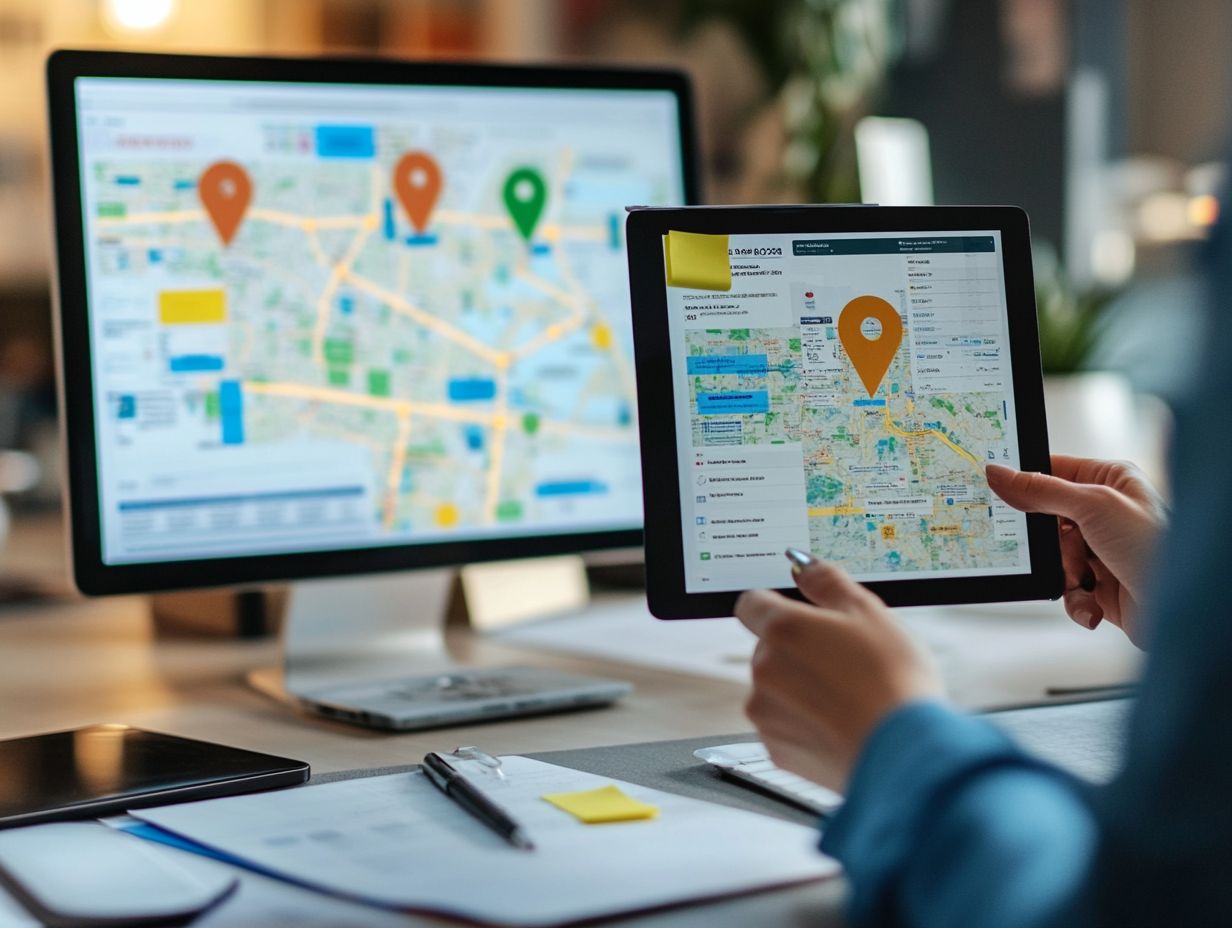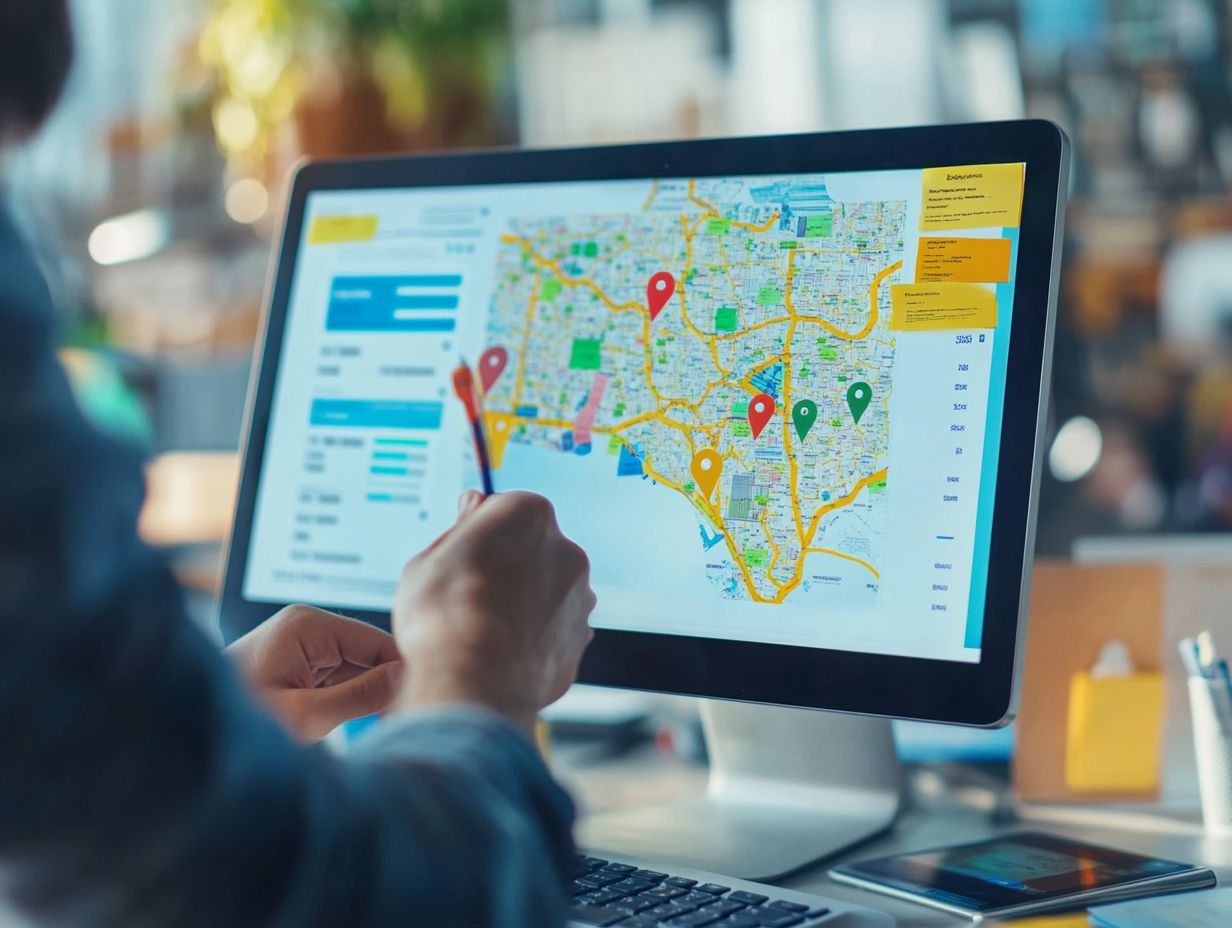Local SEO is essential for businesses aiming to connect with nearby customers, drive more foot traffic to their locations, and enhance their local search visibility through strategic SEO strategies.
In this article, we’ll walk you through the fundamentals of local SEO, why it matters, and strategies to enhance your online presence effectively, including optimizing your business ranking on search engine results pages (SERPs).
You’ll discover how to optimize your Google My Business listing, employ on-page SEO techniques, and leverage online reviews, mobile optimization, and NAP consistency to your advantage.
We’ll also delve into the roles of social media, local citations, compelling content, and customer engagement in boosting your search rankings and improving your online visibility.
Ready to elevate your visibility and attract more local customers? Let’s get started!
What is local SEO, and why is it important for businesses?
Local SEO, or Local Search Engine Optimization, is a strategy to boost a business’s online presence in its local area. It involves keyword optimization and helps your business appear in local search results, making it easier for nearby customers to find your services.
By using local keywords and aligning with search intent, businesses can increase their visibility in local search outcomes and on Google Maps, thereby attracting more local visitors to their websites. Local SEO is vital as it directly affects customer interaction, conversion rates, and overall business growth.
For small businesses, mastering local SEO can set them apart from competitors by improving their organic traffic and search visibility. Unlike general SEO, which targets a wide audience, local SEO focuses on specific local demographics, allowing businesses to customize their marketing efforts.
This focused approach not only boosts website traffic but also improves the consistency of vital business information like Name, Address, and Phone number (NAP), enhancing credibility and trust.
By understanding local customer feedback, businesses can refine their products and services to better serve the community’s needs.
How can you optimize your Google My Business listing for local SEO?
Optimizing your Google My Business (GMB) listing is crucial for effective local SEO and can greatly improve your business’s online presence. Ensuring that your business information—such as name, address, and phone number (NAP)—is accurate and up-to-date helps boost your rankings in local searches and on Google Maps.
Using local citations and managing customer reviews can increase your credibility and visibility, making it easier for potential customers to find and engage with your business while enhancing your overall online reputation management.
Clearly setting your operating hours helps customers know when they can visit or contact you. Adding high-quality photos can showcase your products or services and attract new clients. Utilizing Google Posts to share promotions, events, or updates keeps your audience engaged and informed.
Actively responding to customer reviews, whether positive or negative, shows that you value feedback, improves your reputation and trustworthiness with potential clients, and aids in local engagement and customer loyalty.
What are the key on-page SEO tactics for local search visibility?
On-page SEO strategies are key for improving local search visibility and ensuring your website meets local search needs. These strategies involve optimizing title tags and meta descriptions with local keywords and using schema markup and structured data to show search engines the geographic relevance of your business.
Content that reflects local demographics and seasonal promotions can further engage your audience, making it easier for them to find your business in search results. Maintaining appropriate keyword density throughout the content helps search engines categorize your site effectively without appearing spammy.
Optimizing images with alt text that includes local keywords allows search engines to index images correctly and supports accessibility for users. As more customers use mobile devices to search for nearby services, it’s crucial to ensure your website is mobile-friendly, supporting mobile responsiveness and enhancing user experience.
This involves using responsive design elements that provide a seamless experience on smartphones, tablets, and desktops, building a stronger connection with the local community.
How do local citations affect your business ranking?
Local citations are crucial for improving your business ranking in local search results. These citations are online mentions of your business’s name, address, and phone number (NAP) on various directories and platforms. Consistent and accurate local citations build credibility with search engines, leading to better local search rankings. Citation building helps establish your business’s presence in relevant local markets, thereby increasing local traffic and visibility in search results, contributing to improved organic search visibility.
To enhance online presence, businesses should use various citation sources, including Google My Business, Yelp, Yellow Pages, and niche-specific platforms. Consistency in NAP information across channels is important, as discrepancies can confuse users and search engines, affecting your business’s credibility and impacting your online listings.
Strategies for building citations include:
- Creating profiles on directories
- Encouraging satisfied customers to leave reviews
- Monitoring for and correcting inaccuracies
Additionally, acquiring local backlinks from reputable websites can significantly improve local search rankings by signaling authority and relevance within the community, enhancing your local link-building efforts.
What role do online reviews play in local SEO?
Online reviews are crucial for local SEO as they influence customer perceptions and boost your business’s online reputation. Positive reviews act as social proof, validating your business for new clients and improving your rankings in local search results, while supporting online reputation management.
Effective management of reviews that encourages genuine feedback can increase your visibility in local searches and build trust with your audience.
Responding to both positive and negative reviews shows that your business values customer input and is committed to continuous improvement. Recognizing happy customers can foster loyalty and repeat visits, while addressing negative feedback shows a commitment to resolving issues and improving user experiences.
This engagement helps build a community around your brand and signals to search engines that your business is active and responsive, which can enhance local search rankings. Companies that focus on interacting with reviews often see higher conversion rates, as potential customers are more likely to choose businesses that are open and accountable, fostering long-term customer loyalty.
How can mobile optimization enhance your local SEO efforts?
Optimizing for mobile is crucial for improving local SEO, especially as more users conduct local searches on their phones. A mobile-friendly design enhances user experience by ensuring quick loading times and correct display on various screen sizes, improving both website performance and page speed.
This not only helps keep visitors on your site but also boosts your rankings in local search results, making it easier for potential customers to find you on platforms like Google Maps.
Implement a responsive design that adjusts content for different devices. Fast mobile page loading is vital, as slow pages lead to high bounce rates.
Using analytics tools can help track mobile user interactions, offering insights into visitor behavior and preferences. By analyzing this data, businesses can make informed decisions to improve engagement and tailor the mobile experience, creating an appealing online presence that meets modern consumer needs and integrates seamlessly with their digital marketing strategy.
What are effective local link-building strategies for your business?
Effective local link-building strategies can greatly improve your local SEO by increasing your website’s authority and bringing in more targeted traffic. Building local backlinks through community involvement, partnerships, and collaborations with local organizations can strengthen your credibility with search engines.
This not only boosts your business ranking but also helps you connect with the local audience, leading to higher customer loyalty and conversion rates.
Focus on quality over quantity by earning backlinks from reputable local websites. Engaging in sponsorships, like supporting community events or local charities, can offer valuable exposure and backlinks from respected sources, enhancing your business’s geographic targeting and local engagement.
Guest blogging on local sites allows you to share useful content while benefiting both parties. Using local industry directories helps you obtain backlinks and ensures visibility in local searches.
These tactics build a strong link profile, enhancing trust and authority with both consumers and search engines and supporting your overall online networking efforts.
How can social media influence local SEO rankings?
Social media plays a key role in improving local SEO rankings by increasing your online visibility and engaging your local audience. Being active on social media can drive more traffic to your website, boost brand awareness, and enhance your SEO efforts.
By sharing relevant content and interacting with your community, you can generate social signals that improve local search rankings and attract more customers, supporting both search visibility and content marketing efforts.
Content like videos, infographics, and live streams often engage followers effectively and encourage sharing. Consistent posting is important; a regular schedule helps set expectations for your audience and keeps your brand prominent.
Integrating social media with your digital marketing strategy can strengthen your results, ensuring that promotions, updates, and brand messages align across different platforms, and enhancing both user-generated content and audience targeting.
This unified approach not only builds trust but also enhances customer loyalty, essential for long-term success.
What are the best practices for creating location-specific content?
Creating content tailored to specific locations is key to a successful local SEO strategy, as it helps you connect more personally with your target audience. By using long-tail keywords that match local demographics and search intent, your content can better attract potential customers looking for services in their area. This approach not only increases user engagement but also boosts your business’s ranking in local searches. Additionally, utilizing keyword optimization and on-page SEO can further enhance your visibility.
There are different types of location-specific content that can boost local visibility. Blog posts about community news, local guides, or customer stories can build authority and drive traffic. Landing pages optimized for specific areas can directly improve conversion rates by appealing to local customers. Promoting local events through your platform fosters community engagement and establishes your business as a local presence. Incorporating geo-targeting and structured data can also enhance your connection with the local community.
By incorporating locally relevant keywords and focusing on mobile users in all these content types, businesses can build a strong online presence that attracts and keeps local consumers. Furthermore, ensuring NAP consistency and leveraging local directory submissions can solidify your local search standings.
How can you measure the success of your local SEO strategies?
Measuring the success of your local SEO strategies is important to understand their impact and improve future efforts. Key metrics like organic ranking, website traffic, and user engagement show how well your strategies are working. Regularly checking your Google My Business insights and citations can provide valuable data for assessing performance.
Using tools like Google Search Console and analytics platforms, you can monitor the effectiveness of your local SEO efforts to ensure your business stays visible in local searches. Conducting site audits and monitoring search engine algorithms can help you stay ahead of changes that might affect your ranking.
Along with these basic metrics, focus on conversion rates from local search visitors, along with customer reviews and ratings, which greatly affect local rankings. Testing different keywords and content formats can help identify what works best with your audience, allowing for more targeted optimizations. Engaging in competitor analysis and social media integration can also provide insights into effective strategies.
By regularly analyzing this data and adjusting strategies, businesses can remain flexible, adapting to changes in search algorithms or consumer behavior to maintain a strong position in their local markets. Incorporating audience targeting and local link building can further enhance your local SEO results.




